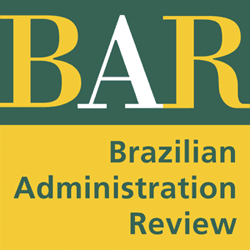EDITORIAL
Dear BAR Readers,
It is with great satisfaction that I can assure you that BAR has been working hard to streamline the review and publishing process. Most reviewers have been responding in a timely manner (thank you for your invaluable assistance!) and with the necessary rigor. BAR also advanced the publication of six articles (in a special issue as of May 2012), in order to reduce the time between paper acceptance and its effective publication. Fast track papers (i.e., the best papers selected from ANPAD meetings), in particular, have been treated to quite a speedy process.
Now that more journals published in Brazil have justifiably ascended to a higher rank (A2 CAPES/Qualis), our responsibility to the academic community becomes even greater.
So, it is my pleasure to bring to you six good contributions.
The first article ("How Consumers Persuade Each Other: Rhetorical Strategies of Interpersonal Influence in Online Communities", by Daiane Scaraboto, Carlos Alberto Rossi and Diego Costa) makes use of netnography and computer-mediated discourse analysis in order to bring an interesting account of rhetorical strategies employed by consumers in their exchange of information related to products and brands in an online community.
The second article ("Perceptions of Equity and Justice and Their Implications on Affective Organizational Commitment: a Confirmatory Study in a Teaching and Research Institute", by Moisés Balassiano and Denise Salles) addresses individual commitment in a context of new organizational structures and 'boundary-less' careers, and discusses the increasing challenge to identify and retain individuals who add value to an organization.
The following article ("Theorizing ICT and Society in the Brazilian Context: a Multilevel, Pluralistic and Remixable Framework", by Marlei Pozzebon and Eduardo Diniz) advances a conceptual framework that is argued to be particularly useful for Brazilian ICT (information and communication technology) researchers. This framework encompasses three theoretical perspectives (social shaping of technology, structurationist view of technology, and contextualism), four main concepts (relevant social groups, interpretive frames, negotiation, and technology-in-practice) and three dimensions (context, process and content).
The fourth article ("Do Organizational Incentives Spur Innovation?", by Henrique Barros and Sergio Lazzarini) discusses how the appropriation of gains from innovation by employees affects their willingness to contribute new ideas. The impact of organizational incentives (performance-based pay and performance-based promotion) is investigated. Results indicate that promotion is a more useful tool than pay for encouraging innovation.
The next article ("Access to Tacit Knowledge by Executive Retention in Cross-border Acquisitions ", by John Child, Roberto Duarte, Betania Tanure and Suzana Rodrigues) examines a phenomenon pertaining to international acquisitions: how to get access to the technical and social knowledge of the local environment that acquired company executives possess. Findings suggest that the specific characteristics of the knowledge acquired companies' owners and/or executives have is essential to explain their retention.
The sixth article ("Credit Card Risk Behavior on College Campuses: Evidence from Brazil", by Wesley Mendes-Da-Silva, Wilson Nakamura and Daniel de Moraes) investigates factors that affect the propensity of students to engage in risky behavior related to credit card use. In particular, the impact of number of credit cards possessed and of knowledge about interest rates charged are examined.
I would like to conclude by expressing my satisfaction about the recent appointment of Prof. Ricardo Leal as Associate Editor of BAR, while he will keep his duties as Editor-in-Chief of Revista Brasileira de Finanças. Prof. Leal is one of the most brilliant researchers I have ever known not only acclaimed in Brazil as CNPq A1-level researcher, but also renowned abroad while also being assertive, responsive, and willing to help other (both novice and experienced) researchers to move up the ladder of science development. It is an honor for BAR to count on his expert assistance from now on.
All best wishes,
Jorge Carneiro
Editor-in-Chief
Publication Dates
-
Publication in this collection
16 July 2012 -
Date of issue
Sept 2012

